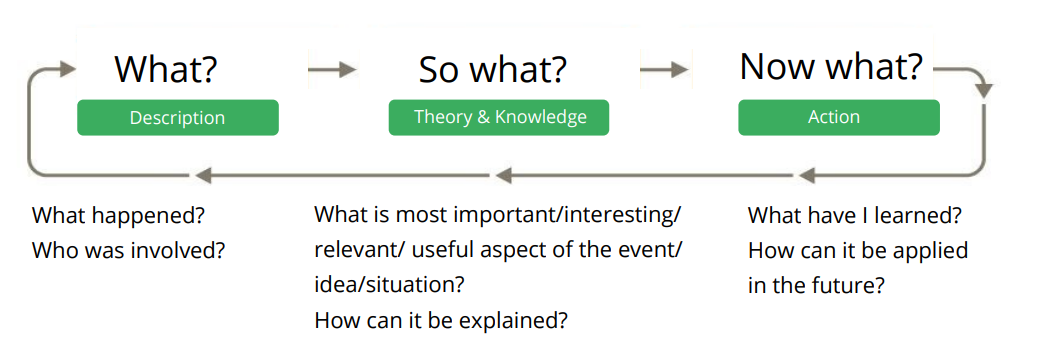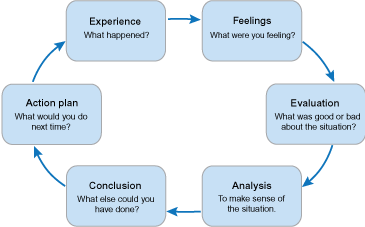Reflection
Reflection, like critical thinking, is an active process and a skill that can be learned and improved upon. Reflective thinking is “a process of identifying, questioning, and assessing our deeply-held assumptions—about our knowledge, the way we perceive events and issues, our beliefs, feelings, and actions” (University of Waterloo, 2024, para. 1). Based on that definition, we can examine how we might engage in reflective thinking. One model of reflection is the “What? So what? Now what?” process developed in 2001 by Rolfe et al. (as cited in Otago Polytechnic, n.d.). See Figure 1 below.

Questioning techniques are a way to start the reflection process. Instead of taking events, experiences, information, and opinions at face value, begin to explore them. What happened? Who was involved? What did you observe? Begin to critically reflect on the experience. What are the facts? What are the assumptions? What are your thoughts and perspectives on what occurred? This is the first step where you begin to observe, describe, and explore the context of the event.
From these thought processes, we move to “So what?” What does it mean, and why is it important? This question explores the knowledge, emotions, and theory of what happened. This second step leads us to analyze our assumptions and worldviews, and those of others. Could this situation be understood in different ways? How can this experience or emotion be understood and explained? What connections can you make to past experiences? How could this be an opportunity to learn, challenge oneself, and grow?
These deeper questions lead us to the last step, “Now what?”, where we have a choice to take action. How can this experience provide an opportunity to act differently in the future? What goals or challenges can you give yourself for the future? What did you learn about yourself that you can improve upon going forward? What would you do differently next time? From these three guiding steps, we move out of non-reflective, reactionary, or ego-based thinking to a critical and active approach that enhances self-awareness, fosters personal growth, and improves interpersonal communication.
As Figure 2 shows, reflective thinking is a nonlinear process—another layer of understanding can be extracted each time we reflect upon an experience. Reflection on external and internal experiences, i.e. self-reflection, leads to many positive opportunities for growth. Learning and practising this type of thought process allows us to grow as individuals, helps us to understand others, and demonstrates empathy. Engaging in this process leads to improved decision making, heightens problem solving, and sharpens our critical-thinking skills. All these steps lead to greater understanding of self and challenge us to analyze our reactions and triggers, observe them, and respond in new ways.

References
Otago Polytechnic. (n.d.). Reflective writing. https://studentsupport.op.ac.nz/assets/Uploads/files/Reflective-writing-2024.pdf
University of Waterloo. (2024). Critical reflection. Writing and Communication Centre. https://uwaterloo.ca/writing-and-communication-centre/critical-reflection
Image Credit
Figure 2: [Reflective model] by New Zealand Government, CC BY 4.0.
Figure 2: Gibb’s reflective cycle by Eric Addae-Kyeremeh and Payam Rezaie for The Open University, adapted from Gibbs (1988), CC BY.
An interpersonal skill whereby we actively analyze events to make sense of them and respond differently in the future.
A higher level thought process where information is analyzed using logic, objectivity, and reasoning to consider all facts and come to a reasonable decision.

